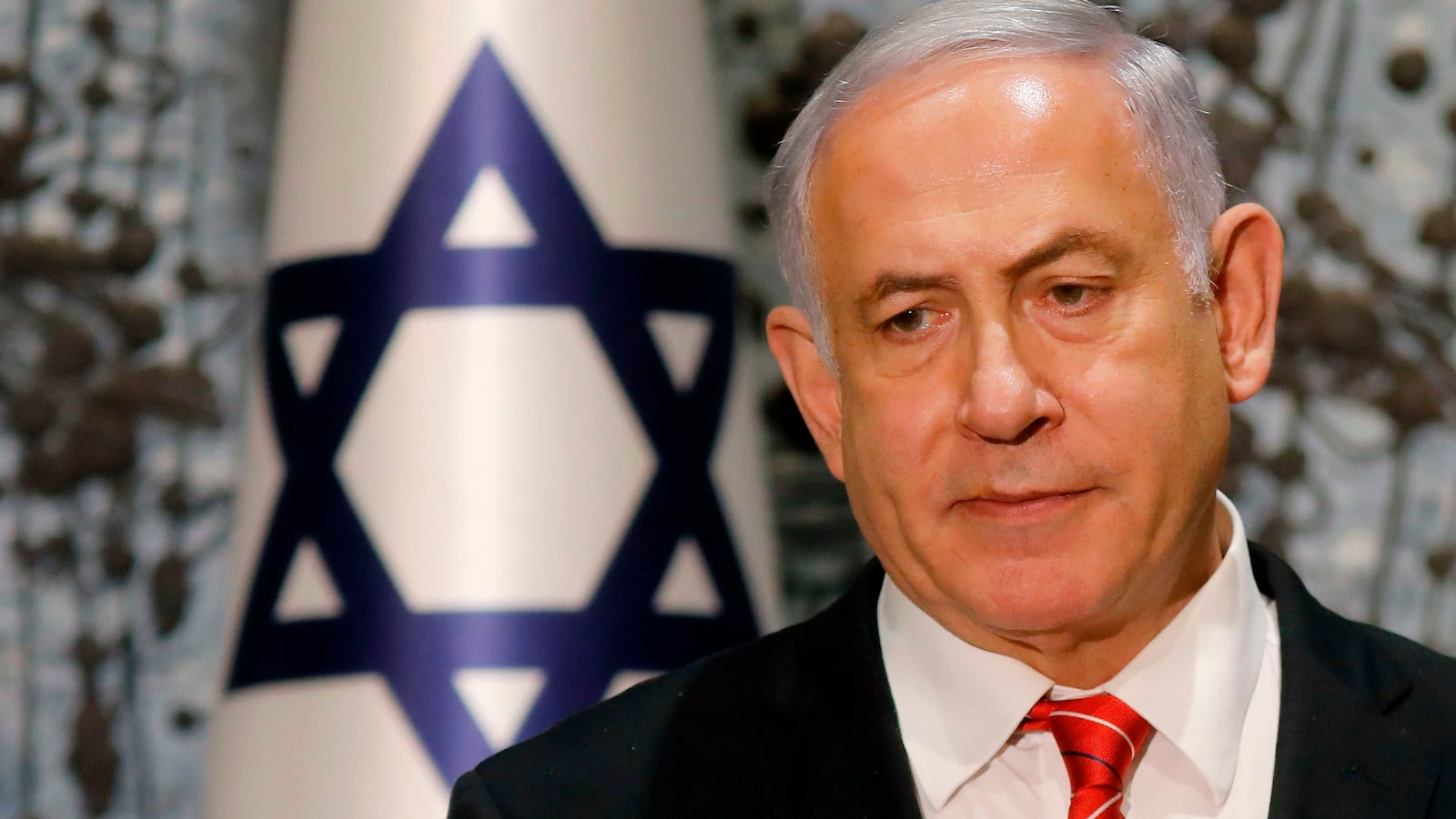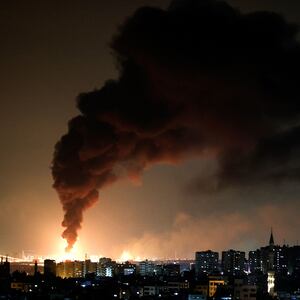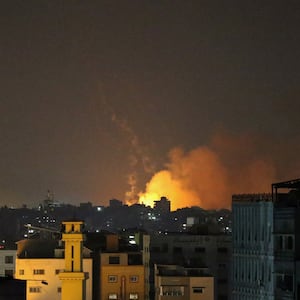In one of his final acts, Israeli Prime Minister Benjamin Netanyahu’s multi-pronged efforts to remain in power laid the groundwork for the unprecedented burst of violence terrorizing Israeli streets—and helped to ignite the flames that have engulfed the lives of Jews and Arabs in the Holy Land alike.
Now, 71-year-old Netanyahu is poised to take advantage of the chaos to push Israel into a fifth consecutive electoral campaign, which would keep him in power as caretaker prime minister for up to six months.
Israeli-Palestinian tensions long predate Netanyahu, but “his actions have exacerbated them,” Shalom Lipner, a senior fellow at the Atlantic Council and 26-year veteran analyst in the Israeli prime minister’s office, told The Daily Beast.
“Netanyahu created ample space for Hamas to thrive in Gaza and mount a formidable challenge to wrest control of the West Bank. Plus, Netanyahu’s rhetoric, which pitted opposing camps—left and right, Jews and Arabs—against each other in Israel, has laid the groundwork for the violence which has erupted now across the country.”
Netanyahu’s fraught relationship with police—and police efforts to appease him—is also front and center in the current crisis. Speaking to Israel Army Radio, former police commissioner Assaf Hefetz said that the police’s failure to contain civil disorder was a direct result of years of the prime minister sabotaging the credibility of law enforcement after investigations were launched into the alleged crimes for which he is currently on trial.
Political analyst Afif Abu Much told The Daily Beast that “evident political factors affected the police’s function,” which have involved violent raids on the Al-Aqsa mosque and blocking the access of Muslim worshippers to Jerusalem. “It is clear that they are responding to pressure from above.”
Netanyahu’s support for the radical extremist Itamar Ben Gvir is also seen as a catalyst for the violence. Israeli media reports that Yaakov Shabtai, the new police commissioner, explicitly warned Netanyahu that “Ben Gvir is responsible for Arab-Jewish riots.”
The crisis has been building up since mid-April, when police set up metal barriers at Jerusalem’s Damascus Gate, forcing Muslim worshippers to pass through police lines on their way to pray at the Old City’s Al-Aqsa Mosque, which triggered protests by Palestinian youths at the site.
In reaction, several hundred adherents of the KKK-like Jewish extremist group Lehava, which was founded by Ben Gvir, marched through downtown Jerusalem chanting “Death to Arabs.” This was echoed on Thursday, when about two dozen extremist Jewish men strode through Machane Yehuda, Jerusalem's central market, yelling out the same phrase.
In another police action which provoked fury, a convoy of busses carrying Muslim worshippers from the Galilee to Jerusalem was blocked ahead of Laylat al Kader, the holiest night of Ramadan, which fell on Friday, May 7. Images of men, women and children striding along the highway, marching the 13 miles to the mosque, blanketed the nation’s media. The police response—which included the use of water cannons, pepper spray, and stun grenades against civilians in the mosque—has been widely panned as disproportionate.
According to the Palestinian Red Crescent, in the three days the barriers remained in place over 600 Palestinians were hurt in Jerusalem, including more than 400 who required hospitalization.
Police messaging about the barriers that began the upheaval has been baffling. Before withdrawing the contentious Damascus Gate barricades, Shabtai falsely stated that they were installed every year. On Thursday, a senior security official claimed they were put in place “to protect the public after the catastrophic stampede at Mount Meron,” which took place on April 30, more than two weeks after the barriers came down.
A number of factors have inflamed Israeli-Arab relations inside the country, including Netanyahu’s attempt to co-opt the Islamic Movement to his side—before rejecting it. But the images of busses stopped by the side of the highway, and citizens denied access to Al-Aqsa, are “unforgettable,” said Abu Much, who publishes columns in the online magazine Al-Monitor and in the Israeli daily Yediot Ahronot.
“We’ve had prime ministers before,” he told The Daily Beast, “and we’ve had Ramadans, but never something like this. Netanyahu was itching for a fight.”
The violence quickly spread beyond Jerusalem. On Monday, May 10, Hamas began launching rockets into Israel, leading to retaliatory airstrikes that have killed 119 Palestinians, according to the Hamas ministry of health. On Thursday, a massive hour-long attack by Israeli artillery, air force and tank fire on the fourth night of the battle between Hamas and Israel left several Gazan buildings in ruin and prompted countless residents to evacuate their homes.
On Thursday, the Israeli army said that 2,000 rockets have been launched into the country since the start of combat, resulting in eight Israeli deaths.
The usually joyous holiday of Eid al-Fitr, marking the end of Ramadan, slunk into a post-apocalyptic Israeli panorama of gang fights on empty streets irregularly patrolled by heavily armed border police officers. While Gazans rushed around rubble for cover, Israelis packed into bomb shelters, and air raid sirens rang out with unnerving frequency in another long night on the precipice of war.
The eruption of violence has coincided with the most vulnerable period in Netanyahu’s 12-year rule—and he stands to benefit from it.
Following inconclusive march elections and Netanyahu’s failure to form a coalition, Israeli President Reuven Rivlin handed the task to centrist Opposition Leader Yair Lapid on May 5.
Before Thursday’s explosion of violence, both on the Gaza border and within Israel, Lapid was close to establishing what he calls “a government of change,” made up of motley political parties that oppose Netanyahu from left and right.
The hope appeared to be dashed by Naftali Bennett, a crucial right-wing member of Lapid’s possible coalition, who on Thursday night abandoned the effort and appeared willing to rejoin Netanyahu.
“We are at the edge of the abyss,” Lapid said, in somber remarks about the night’s events. “We knew it would come. The writing was on the wall.”
“You cannot do everything within your power to damage the police and then be surprised when they don’t come. You cannot attack the courts for years and express surprise when people act with contempt for the law.”
Lapid did not utter Netanyahu’s name, but he didn’t have to. The reference to Netanyahu’s support of the racial supremacist Ben Gvir was clear when Lapid condemned him for “making every effort to introduce the forces of hate into the parliament, and cannot feign shock when hate erupts and burns us from within.”
Ben Gvir is a devotee of the Israeli-American mass murderer Baruch Goldstein, who in November 1994 turned a machine gun on Muslims during morning Ramadan prayers in the West Bank city of Hebron, killing 29. Netanyahu backed his election to the Knesset, Israel’s parliament, in the hope that the marginal vote would help secure a governing coalition, and possibly pass a law of legal immunity.
Once it was clear that the opposition would be able to patch together a coalition, Louis Fishman, Brooklyn College professor of Middle Eastern politics, told The Daily Beast: “We saw a rapid escalation.”
“There is no doubt in my mind that instead of deescalating, Netanyahu and his police minister unleashed the police to act disproportionately towards Palestinian citizens of Israel—and allowed them to bring it to the point we are at today.”



